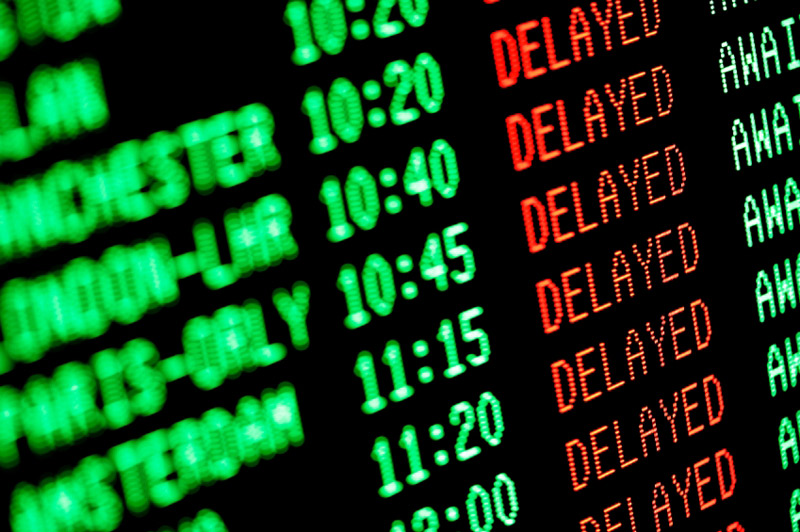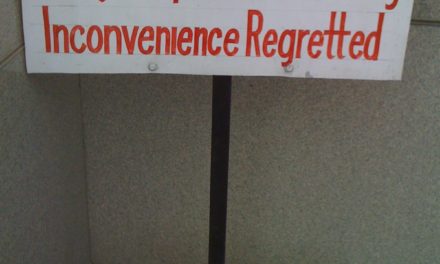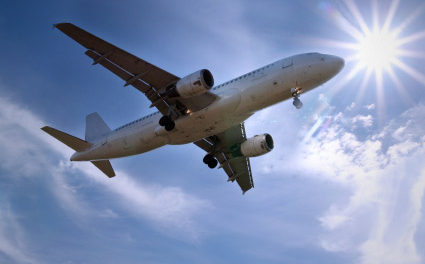You already arrive early and expect the flight has a chance of leaving late. So what can you do to pass some of those potentially long hours in the airport? Here are three ways I try to make air travel comfortable and productive:
Stay Connected at the Airport
If there’s one thing we need when traveling, it’s access to the Internet — it allows us to stay connected to work or even provide a relief of entertainment. Many airports already offer free wifi (tip: check out this open source directory of free wifi at airports) and those business travelers who have high status with an airline can always enjoy complimentary wifi in the lounges.

Hanging out at the airport business lounge is one of the best ways to pass time while waiting for your flight. Iberia lounge at Barcelona El-Prait Airport. © 2011 Rob Hard
However, free wifi still remains elusive at some of the larger airports such as O’Hare in Chicago. However, there are several alternatives at these paid airports:
- Paid Airport Wifi: Boingo is one of the leading wifi providers currently in airports and include a shared service option that allows two people to connect at the same time (plans in the U.S. are priced at around $10 a month, but are higher for international programs). I find that frequent business travelers who fly in and out of these airports will actually purchase the plan even if the company does not reimburse them since having internet access is critical to their employment.
- Mobile Hotspots: These basically act as a wireless router configured in a specific range, and you do not have to be connected to a computer to get an internet connection. These are incredibly useful since they normally provide a strong signal, are small and can also allow for multiple device connection. Some of the better Mifi devices on the market are the Verizon 4G for $49.99 for a two year contract and the T-Mobile Sonic 2.0 which is around five dollars a month. There are also rentals that are available from XCom Global (my personal favorite) for those business travelers who will not need them year round or who may need them for international travel for $14.95 a day. Keep in mind that with regular Mifi hotspots the data plans are purchased separately and can normally be combined with the current data phone plan. Time Magazine recently published a data comparison between plans that can be used as a reference.
Healthy Food at the Airport
After a week of eating out on the road, it’s incredibly annoying to go through security and then having limited food options. It is very common to be stuck with having unhealthy food choices after security due to either a short amount of time until boarding or the limited number of food court of restaurant options – even many of the business lounges tend to only offer sugar and carb heavy snacks.
This, plus the fact that airlines have eliminated the free snacks and meals from domestic airline flights, only adds to the need to purchase food before departure.
But there are some healthier options for business travelers at the airport – they just take a bit of work to find. Recently, the Physicians Committee for Responsible Medicine, a nonprofit medical group, published a study on November 15, 2013 around these options for business travelers in airports.
The trend for healthier plates has been increasing at the 18 busiest airports in the United States with 57% of eateries in these airports offering one healthy option in 2001 to 76% in 2013. This may not make dieticians happy, but it’s a start and I suspect that trend toward healthier options should continue.
Denver, Detroit and Chicago O’Hare are at the top of the list in the upper 80% while Atlanta is slightly over 50% at the bottom. These studies show the initiative being taken by airports in response to awareness around business travelers.
These are some food tips you may want to keep in mind when traveling:
- Bring a meal with you: Prepare a meal before going through security. Many business travelers have access to grocery stores through either a rental car or close proximity to a hotel. A quick trip to the grocery store and a packed meal can save the hassle of being limited to unhealthy options at the airport and allows for a greater variety in choice.
- Find a healthy restaurant: Print an airport map ahead of time to locate a healthy restaurant in the airport. This is an ideal option for those who have some time as well as preferred food choices. Many of the busier airports are large and require substantial time to go from gate to gate. Planning ahead will save time and ensure that the business traveler will make it to the healthy choice.
- Research the calories: Many airport restaurants are chains and have their entire menus online. Before placing your order, look at the menu online and choose the healthier options. Good planning will help the business traveler avoid a time crunch when arriving at the gate.
Be Ready for Airline Cancellations
The first and last thing you need to prepare for and expect is a complete cancellation of flights. When that happens, you can be forced to spend the night at a nearby hotel, forcing you to wait until the following morning.
If the airport hotels (and airline partner hotels) are entirely booked depending on the severity of cancellations, business travelers could face the possibility of not having a place to stay. Here are some good business travel practices that I find can help in case of these events:
- Use a mobile boarding pass via passbook: This will notify the business traveler via alerts on his or her mobile device with regards to changes in flight information. I always use mobile boarding passes for flying and this will certainly help notify you as soon as possible as to whether your flight is cancelled and you need to make other plans.
- Keep up to date with weather and airport conditions: Many airlines have waived cancellation fees and business travelers should take advantage of this trend. If you know that your destination or connecting airport is having weather related issues beforehand, you can reroute your flight through a different airport.
- Identify nearby hotels: Lookup airport hotels the airport-the night before departure. This will save you time and give you a slight advantage when limited rooms are likely to be available when wide spread cancellations that may occur.
- Carry-on bags whenever possible: Checking bags may lead to airline misplacement and in case of severe cancellation, can lead to lost baggage. You may need all of your travel items in case of cancellation.
- Keep your airline customer service number handy: If you receive notification before you arrive at the airport, it is much easier to call customer service than to wait in the long line at the airport. Also, the airline customer service may issue you your vouchers for food and hotel over the phone, so you can coordinate those details from a more convenient location.
These easy travel tips can help you cope with air travel and make your experience much easier.
Have you been stuck at the airport? How do you pass the time? Share your tips and insights here.





